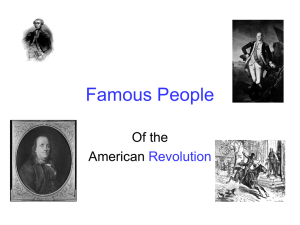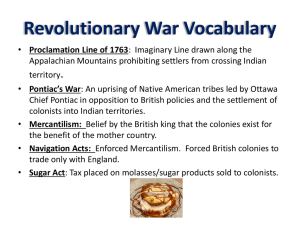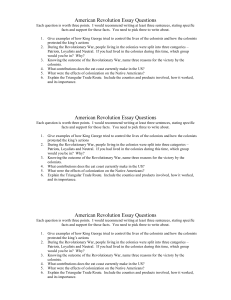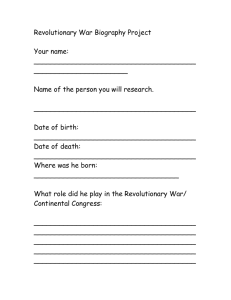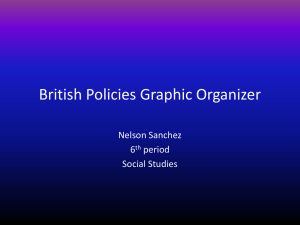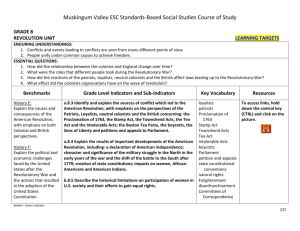Causes of the American Revolution - Database of K
advertisement
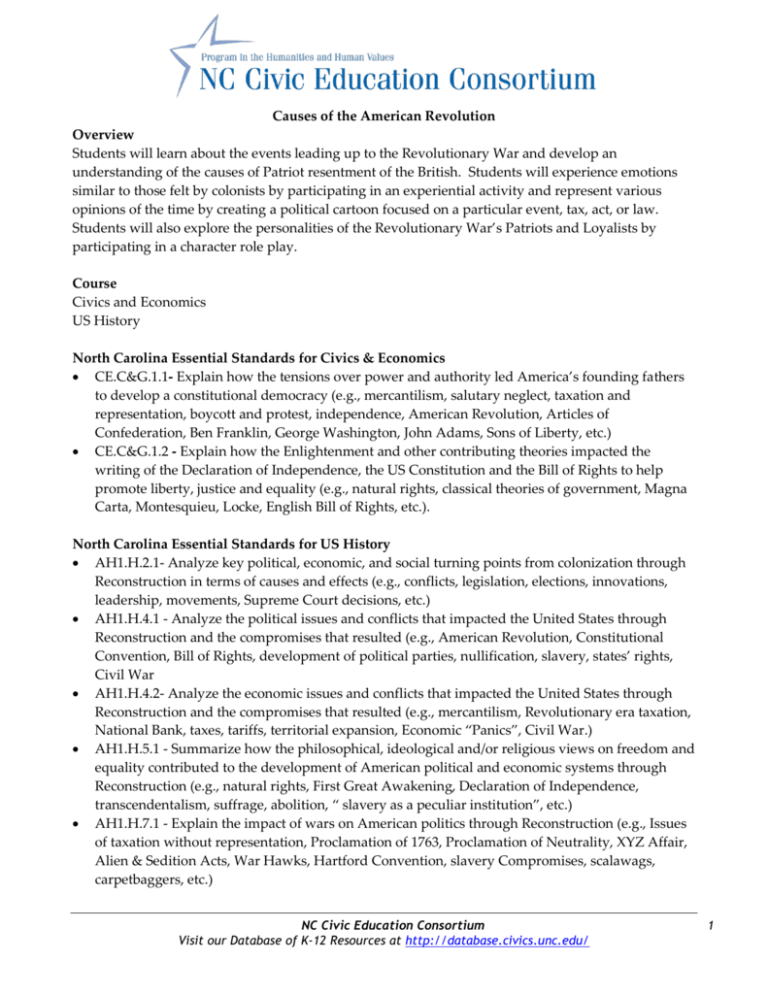
Causes of the American Revolution Overview Students will learn about the events leading up to the Revolutionary War and develop an understanding of the causes of Patriot resentment of the British. Students will experience emotions similar to those felt by colonists by participating in an experiential activity and represent various opinions of the time by creating a political cartoon focused on a particular event, tax, act, or law. Students will also explore the personalities of the Revolutionary War’s Patriots and Loyalists by participating in a character role play. Course Civics and Economics US History North Carolina Essential Standards for Civics & Economics CE.C&G.1.1- Explain how the tensions over power and authority led America’s founding fathers to develop a constitutional democracy (e.g., mercantilism, salutary neglect, taxation and representation, boycott and protest, independence, American Revolution, Articles of Confederation, Ben Franklin, George Washington, John Adams, Sons of Liberty, etc.) CE.C&G.1.2 - Explain how the Enlightenment and other contributing theories impacted the writing of the Declaration of Independence, the US Constitution and the Bill of Rights to help promote liberty, justice and equality (e.g., natural rights, classical theories of government, Magna Carta, Montesquieu, Locke, English Bill of Rights, etc.). North Carolina Essential Standards for US History AH1.H.2.1- Analyze key political, economic, and social turning points from colonization through Reconstruction in terms of causes and effects (e.g., conflicts, legislation, elections, innovations, leadership, movements, Supreme Court decisions, etc.) AH1.H.4.1 - Analyze the political issues and conflicts that impacted the United States through Reconstruction and the compromises that resulted (e.g., American Revolution, Constitutional Convention, Bill of Rights, development of political parties, nullification, slavery, states’ rights, Civil War AH1.H.4.2- Analyze the economic issues and conflicts that impacted the United States through Reconstruction and the compromises that resulted (e.g., mercantilism, Revolutionary era taxation, National Bank, taxes, tariffs, territorial expansion, Economic “Panics”, Civil War.) AH1.H.5.1 - Summarize how the philosophical, ideological and/or religious views on freedom and equality contributed to the development of American political and economic systems through Reconstruction (e.g., natural rights, First Great Awakening, Declaration of Independence, transcendentalism, suffrage, abolition, “ slavery as a peculiar institution”, etc.) AH1.H.7.1 - Explain the impact of wars on American politics through Reconstruction (e.g., Issues of taxation without representation, Proclamation of 1763, Proclamation of Neutrality, XYZ Affair, Alien & Sedition Acts, War Hawks, Hartford Convention, slavery Compromises, scalawags, carpetbaggers, etc.) NC Civic Education Consortium Visit our Database of K-12 Resources at http://database.civics.unc.edu/ 1 Essential Questions What were the causes and effects of the Revolutionary War? How did colonist’s perspectives of colonial laws and taxes issued during the Revolutionary Period differ from the perspective of the British? What events occurred that enhanced hostility between Patriots and Loyalists? How are Patriots and Loyalists alike? How are they different from one another? What events intensified Patriot feelings of revolution and led to the outbreak of war? Who were the key Patriots and Loyalists of the period, and what contributions did they make? What was the purpose of Patrick Henry’s speech to the Virginia Convention and Benjamin Franklin’s Albany Plan of Union? Materials Fictional “Memo from the Superintendent,” example attached “Causes of the American Revolution Power Point” (optional); available in the Consortium’s Database of K-12 Resources (in PDF format) o To view this PDF as a projectable presentation, save the file, click “View” in the top menu bar of the file, and select “Full Screen Mode” o To request an editable PPT version of this presentation, send a request to cnorris@unc.edu America’s Growing Revolutionary Spirit, handout and answer key attached Revolutionary War Political Cartoon Examples, attached Revolutionary Cartoons-Assignment Sheet, attached Engraving by Paul Revere, attached Patrick Henry, “Give me Liberty…,” attached Loyalist and Patriot roles, attached Revolutionary Tea, lyrics and musical score attached Duration Two 60 minute periods Procedure Day 1 Experiencing Unfair Taxation 1. As students enter the room, greet them at the door with a concerned look while handing them a memo (example attached) from the school superintendent, stating that all students will have to pay a tax to use their lockers from today forward. Any students refusing to pay the tax will have to carry their items with them throughout the day. As students read they will be angered by this and you should encourage discussion, charting their comments on the board. As you invite students to comment, also ask them to brainstorm ideas for ways they could appeal this decision. 2. Explain that the superintendent will waive the fee of the first students who volunteer to collect the locker tax from the remainder of the student body and see if any students would like to submit their name. You may also go as far as asking students if any are ready to pay today, so that their locker use is secure for the rest of the month. NC Civic Education Consortium Visit our Database of K-12 Resources at http://database.civics.unc.edu/ 2 3. Finally, explain to students that the memo is not real and have them reflect on their feelings through the process. You may ask questions such as: How did you feel when you read the memo? Why did so many of you feel angry or cheated? Why was your response to this memo so passionate? How did you feel about the superintendent and why? Is there anything he/she could have done to have made you accept this decision more readily? How did you feel about your classmates who volunteered to collect money or pay their tax today? Background Information: Causes of the American Revolution 4. At this point, make it clear to students how their feelings throughout this activity were similar to the feelings of American colonists in the late 1700s, when colonists coined the phrase “no taxation without representation.” Briefly describe parallels such as the Navigation Acts of 1660 & 1663, the Sugar Act, the Stamp Act, and the Tea Act. Optional: Use the Power Point Causes of the American Revolution to disseminate background information and facilitate discussion (available in CEC’s Database of Civic Resources.) 5. Explain to students that they will be focusing on the various issues and events that contributed to America’s sense of independence, and eventually caused the American Revolution. Either in partners or individually, handout the attached worksheet, America’s Growing Revolutionary Spirit, for students to complete. 6. Once students are finished, go over the correct answers and/or take up their work for an assessment and discuss: If you were a colonist living in America in the late 1700s, which event, tax, act, or law would have angered you most and why? As you considered British perspectives and the colonist perspectives, what reoccurring themes did you notice? In what ways did colonists take civic action and express their feelings towards British rule and decisions? (Discuss specific civic activity such as the Non-Importation Association, boycotts, the Boston Tea Party, the Edenton Tea Party, etc.) Imagine if Patriots had not acted on their displeasure. How might things have turned out different in America? Why is civic participation important? Political Cartoons through the Eyes of Loyalists and Patriots 7. Next, project the attached political cartoons one by one for examination. Before discussing the first cartoon, ensure student understanding of what a political cartoon is (represents opinion, irony, commentary, etc.), and how it differs from a simple cartoon drawing or picture. For each revolutionary themed cartoon, discuss: What do you see? (Students should simply point out all symbols, characters, objects, text, etc. that they notice. Try to keep them from jumping to interpretation until all pieces of the cartoon are pointed out.) NC Civic Education Consortium Visit our Database of K-12 Resources at http://database.civics.unc.edu/ 3 What do you think? What message is the artist trying to convey? What do the symbols represent? What techniques has the artist used and why? (exaggeration, caricatures, humor, sarcasm, etc.) If you were an American Patriot, would you agree with the cartoonist? Why? If you were a Loyalist, would you agree with the cartoonist? Why? When discussing “Join or Die,” ensure students leave with the understanding that the artist was Patriot Benjamin Franklin and refers to the Albany Plan of Union, an early attempt to form a union of the colonies. Part of the Plan was used in writing the Articles of Confederation, which kept the States together from 1781 until the Constitution. 8. Explain to students that for homework, they will create their own political cartoon based on the revolutionary term (s) of their choice. Hand out the rubric Revolutionary Cartoon Assignment Sheet and discuss your expectations. Encourage students to ask questions about the assignment. Remind them to create a political cartoon and not a simple drawing. If time permits, allow them to begin brainstorming and creating a rough draft in class. Day 2 Experiential Exercise: The Writs of Assistance 9. This warm up again requires a bit of acting skills on the teacher’s part, but should not take more than a few minutes to act out. As the class gets settled, the teacher should pretend to be very angry and inform students that at some point yesterday, your wallet was stolen out of your desk. Explain that you are disappointed, upset, and fairly certain it was someone in this exact classroom who did it. Ask students if they have any information and escalate your anger when students do not respond. Finally, tell them that you are all going into the hall, and each of them will open their lockers for you to search. Make them believe that you mean business. 10. Finally, let students know that you have made up this scenario. Have students reflect back on their feelings by asking how they felt about the idea of being forced to open their lockers for a search, even when they were innocent. As students debrief, encourage them to connect their feelings to those experienced during colonial times, when many merchants were constantly put in the same situation as British tax collectors presented writs of assistance (search warrants) to go through their businesses. This was another factor in causing American hostility towards the British. 11. As a review of the other causes of the Revolutionary War discussed in the previous class, allow students to share their political cartoons in small groups. 12. Next, project the attached “Engraving by Paul Revere.” Ask students to discuss, either in writing or out loud: What do you see here? (Students should simply point out all symbols, characters, objects, text, etc. that they notice. Try to keep them from jumping to interpretation until all pieces of the engraving are pointed out.) What do you think? What message is the artist trying to convey? What do the symbols represent? What techniques has the artist used and why? (exaggeration, caricatures, humor, sarcasm, etc.) NC Civic Education Consortium Visit our Database of K-12 Resources at http://database.civics.unc.edu/ 4 In what ways does this engraving reflect opinions during the Revolutionary Period? (Facilitate a review of the views of Loyalists and Patriots.) Do you think this engraving was created by a Loyalist or a Patriot and why? Who was Paul Revere? The First Continental Congress 13. Remind students that tensions continued to mount as individual colonists chose sides between the Patriot cause and the Loyalist cause. Ask students: How do you think the 1774 Intolerable Acts added to the sense of tension in the colonies? o Explain to students that in response to the Intolerable Acts, the colonies organized the First Continental Congress on September 5, 1774 in Philadelphia, where official complaints were drafted and sent to King George III. What do you think some of the complaints sent to King George III would have been? (Students should apply their new knowledge of the Navigation Acts, Proclamation of 1723, Sugar Act, Quartering Act, Stamp Act, Boston Massacre, etc.) What do you imagine King George’s response would have been? Choosing Sides: The Loyalists v. Patriots 14. Explain to students that as tensions continued to grow, more colonists developed strong opinions in support or against revolution. While around 10-20 percent of colonists remained loyal to Britain, nearly 50 percent supported the Patriot cause. Around 30-50 percent remained neutral. 15. As an example of Patriot opinion, have students read an excerpt from Patrick Henry’s speech to the Virginia Convention, in which his famous lines “Give me liberty or give me death” were spoken. Project the attached image, and allow a student to do a dramatic reading of the speech excerpt. Discuss: Would you characterize Patrick Henry as a Loyalist or a Patriot and why? To whom is Patrick Henry referring when he says, “Is life so dear or peace so sweet as to be purchased at the price of chains and slavery?” What is the purpose of Patrick Henry’s speech? Based on his words in this speech, how would you characterize and describe Patrick Henry? 16. To counter Patrick Henry’s view, project the following quote by Anglican clergyman Samuel Seabury, the first Bishop of Connecticut: “If I must be enslaved let it be by a King at least, and not by a parcel of upstart lawless Committeemen. If I must be devoured, let me be devoured by the jaws of a lion and not gnawed to death by rats and vermin." Discuss: Would you characterize Samuel Seabury as a Loyalist or a Patriot and why? What symbolism does Seabury use in his statement? What message is Seabury trying to convey? 17. To again show countering views, project the following quotes from Thomas Paine’s Common Sense, published in January 1776: I offer nothing more than simple facts, plain arguments, and common sense . . .O ye that love mankind! Ye that dare oppose, not only the tyranny, but the tyrant, stand forth! Every spot of NC Civic Education Consortium Visit our Database of K-12 Resources at http://database.civics.unc.edu/ 5 the old world is overrun with oppression. Freedom hath been hunted round the globe. Asia, and Africa, have long expelled her--Europe regards her like a stranger, and England hath given her warning to depart. O! receive the fugitive, and prepare in time an asylum for mankind." . . . we have every opportunity and every encouragement before us, to form the noblest purest constitution on the face of the earth. We have it in our power to begin the world over again. A situation, similar to the present, hath not happened since the days of Noah until now. The birthday of a new world is at hand, and a race of men, perhaps as numerous as all Europe contains, are to receive their portion of freedom from the event of a few months. Discuss: What is Thomas Paine trying to persuade colonists to do? What tactics is he using to accomplish this? How would you characterize Paine, based on these quotes and your previous knowledge of him? How does Paine refer to King George III? Why does he describe the King in this way? What effect do you predict this pamphlet had on colonists and why? What role did propaganda have in swaying public opinion regarding the war with Britain? Would you characterize Common Sense as propaganda? Why or why not? Participating in a Debate between the Loyalists and the Patriots 18. Explain to students that they will participate in a partner activity that illustrates the different views of the Loyalists and the Patriots, and the difficulties in compromise between the two sides. Students will either play the role of King George III, a devout Loyalist, or Samuel Adams, a passionate Patriot, as they debate whether or not America should declare Independence. 19. Either assign partners or allow students to choose, and hand each a role (see attached Loyalist and Patriot Roles). Give students 5-10 minutes to study their character and his views and to think about the argument they can present to the other man (encourage students to go beyond the role provided and use all information discussed in class throughout this lesson and prior.) Explain that when the activity begins, they will sit across from each other and, in character, express their views on events in the 1770s, and reasons why they believe revolution is right or wrong. 20. Review partner work expectations and allow students to start their partner meetings. Circulate and monitor all students as they work, ensuring they are in character and representing realistic views. Allow 10-15 minutes for this activity. 21. Once you stop the exercise, debrief by discussing: Based on what you read about each man, how would you characterize King George III and Samuel Adams? After participating in this activity, those of you playing King George III, how did you feel about Samuel Adams and why? Those of you playing Samuel Adams, how did you feel about King George III and why? In your opinion, why are these two men’s views so drastically different? Personally speaking, which man do you agree with and why? NC Civic Education Consortium Visit our Database of K-12 Resources at http://database.civics.unc.edu/ 6 Is there any way these two men, representing Loyalist and Patriot sentiments, could compromise? Explain. Do you think there was anyway to avoid the American Revolution? Explain. What do you imagine life would be like on North America today if Patriots would not have been involved, active citizens and started this revolution? Additional Activities Place students into groups and have them read, analyze, and discuss the attached lyrics/poem “Revolutionary Tea.” You may choose to also have a student with musical ability play the song for class. Instruct groups to prepare their own dramatic presentation showing their interpretation of the poem/song. Hold a Colonial Town Hall & Debate. o Inform students that they will participate in a Colonial Town Hall as a colonial character such as those below: Abigail Adams James Forten Thomas Jefferson William Pitt John Adams Benjamin Franklin John Paul Jones Josiah Quincy Samuel Adams Thomas Gage King George the Third Phoebe Reynolds Ethan Allen Nathan Hale Tadeusz Kosciuszko Paul Revere Benedict Arnold Prince Hall Marquis de Lafayette Betsy Ross Crispus Attucks Alexander Hamilton Sybil Luddington Deborah Sampson Joseph Brant Lemuel Haynes James Madison Gilbert Stuart John Burgoyne Patrick Henry Francis Marion (Swamp Colonel Tye Richard Caswell Joseph Hewes Fox) Horace Walpole John Singleton William Hooper Josiah Martin Joseph Warren Copley Richard Howe Charles Morris Martha Washington Charles Cornwallis William Howe James Otis Benjamin West Lydia Darrah Agrippa Hull Thomas Paine Phyllis Wheatly William Dawes Thomas Hutchinson Molly Pitcher (Mary Charles Wilson John Dickenson Hays) o o o Their purpose at the Town Hall & Debate will be to convince others to believe as they do regarding American Independence. Assign roles and instruct students to research their person using the Internet and other resources, creating a role similar to the ones provided to them in the partner debate. The day the roles are due, instruct students to form groups according to their beliefs, with all Loyalists meeting on one side of the room and all Patriots meeting on the other. Allow them to introduce themselves in character in these groups, and make a statement about their beliefs. The teacher should then allot time for group strategizing. Before the Town Hall & Debate begins, have students arrange their desks so that the Loyalists and Patriots are on opposite sides facing one another in rows. Explain that when the Town Hall & Debate begins, they must introduce themselves one by one, and give their reasons for being for or against American Independence. As moderator, the teacher should facilitate a fair debate process, such as allowing a student from the Patriot side to speak, followed by a Loyalist, followed by a Patriot rebuttal, and so on. NC Civic Education Consortium Visit our Database of K-12 Resources at http://database.civics.unc.edu/ 7 o The teacher may also wish to ask other adults to come to class that day to judge the debate, or the teacher can assign particular students to serve as judges rather than participate in character roles. At the end of the Town Hall Debate, the teacher or assigned judges can determine whether they think declaring independence is a wise idea or not based on what they have heard. If time permits, it is advised that all student created roles be proofread by the teacher before the day of the Colonial Town Hall and Debate so that accuracy is ensured. Differentiation Students with special needs Modify the political cartoon guidelines as needed, assisting students with special needs in choosing the subject matter of his/her cartoon and discussing the opinion they want their political cartoon to represent. If a student is unable to participate as a character in the Loyalist and Patriot Experiential Exercise, assign him/her to be an observer. He/she should monitor a particular partner meeting and take notes on the process. He/she can report back to class on what was observed. If a student is unable to participate in the Colonial Town Hall and Debate, he/she can be assigned to be a debate judge or a Town Hall reporter. As a reporter, he/she should take notes on the Town Hall meeting and then give a colonial news report at the end of the activity. AIG Students Instruct students to research political cartoons further and find current examples that reveal similar themes to the spirit felt during post-Revolutionary America. Students can present these to class and describe their findings. NC Civic Education Consortium Visit our Database of K-12 Resources at http://database.civics.unc.edu/ 8 PUBLIC SCHOOLS OF NORTH CAROLINA STATE BOARD OF EDUCATION DEPARTMENT OF PUBLIC INSTRUCITON 301 North Wilmington Street, Raleigh, 27601 To: From: Date: Re: All North Carolina Principals The Office of the State Superintendent <<insert>> Taxation of student locker use Please note that effective <<insert date>>, all North Carolina public school students will be taxed monthly for the use of their school locker. This tax is non-negotiable, and any student refusing to pay the tax will loose their locker privileges. The funds collected will assist in the proposed renovation of the State Superintendent’s office, as well as the purchase of new office furniture for Board of Education employees working at 301 N. Wilmington Street in Raleigh. The tax will be $4.00 per month, a fee that we feel is quite reasonable. While we understand this may be a controversial issue, it is important all students and families recognize that we have no other choice due to recent budget cuts to our state education budget. We trust that every North Carolina student and family will do their part to assist in this matter. NC Civic Education Consortium Visit our Database of K-12 Resources at http://database.civics.unc.edu/ 9 Revolutionary War Political Cartoons Example NC Civic Education Consortium Visit our Database of K-12 Resources at http://database.civics.unc.edu/ 10 Name: ________________________________________ Revolutionary Cartoons Assignment Expectations and Rubric Due date: ___________________________________ Assignment: Create a political cartoon focused on an event, tax, act, or law that contributed to the outbreak of the Revolutionary War. Expectations Points Possible Points Awarded Meets requirements of a political cartoon: contains opinion, commentary, satire, etc. Content: focuses on contributing factor of Rev. War Accuracy: shows a clear and correct understand of contributing factor represented Graphics: clarity, originality, and relevance to the assignment Creativity: color, original idea evident, overall attractiveness, etc. NC Civic Education Consortium Visit our Database of K-12 Resources at http://database.civics.unc.edu/ 11 Engraving by Paul Revere The able doctor, or America swallowing the bitter draught. Cartoon in line engraving by Paul Revere for the Royal American Magazine, June 1774. NC Civic Education Consortium Visit our Database of K-12 Resources at http://database.civics.unc.edu/ 12 Patrick Henry “Give me liberty or give me death!” “Gentlemen may cry, Peace, Peace-- but there is no peace. The war is actually begun! The next gale that sweeps from the north will bring to our ears the clash of resounding arms! Our brethren are already in the field! Why stand we here idle? What is it that gentlemen wish? What would they have? Is life so dear, or peace so sweet, as to be purchased at the price of chains and slavery? Forbid it, Almighty God! I know not what course others may take; but as for me, give me liberty or give me death! “ ~ Patrick Henry, March 23, 1775. NC Civic Education Consortium Visit our Database of K-12 Resources at http://database.civics.unc.edu/ 13 Loyalist and Patriot Roles King George III ~ Loyalist You are King George III (ruler of Great Britain from 1760-1820). You are incredibly loyal to your empire and think any person of English descent should feel the same intense sense of pride and responsibility to Great Britain that you feel. Thus, you resent the Patriot’s rebellious attitude in America. You think their chief duty is to submit to you and your rule, and you are amazed they have the nerve to even hint at rebellion. You feel that you have done a lot to assist the colonies to be successful. Your empire has come to the rescue of the colonists time and time again when they’ve need protection. If it were not for Great Britain sending assistance during the French and Indian War, the colonists would never have won and survived. Yet, when you ask them to pay back the war debt, they throw a fit. How ungrateful! You decided to help them out by creating the Proclamation of 1763, which placed a boundary upon the westward expansion of the American colonies. The reason you did this was to force colonists to negotiate with local Native Americans for the lawful purchase of the land, since you were tired of all the wars erupting between colonists and Natives over land conflicts. You can’t believe how childish the colonists were being over land! Yet they were enraged by the idea that they couldn’t just take whatever they wanted from whomever they wanted, regardless of the problems it might cause. You feel like an unappreciated father. You keep hearing reports that the Patriot’s anger with you continues to grow due to taxes you have initiated, such as the Tea Act, the Stamp Act, and the Townshend Acts. You think it makes complete sense that colonists share in the burden of governmental and operational taxes. Why should you spend endless amounts of money to keep the colonies safe and productive? You don’t even live over there, and they should be happy to share in the costs. You DARE them to even try and go to war with you. They need to stay loyal and keep QUIET. Then, that rebel group the Sons of Liberty went crazy and dumped $15,000 dollars worth of tea into the Boston Harbor! You had to send British troops over to guard the colonists from doing anything else stupid. And of course they get angry about that, when they asked for it with their immature actions! Today, you are feeling very grumpy, since your Porphyria is acting up. (Porphyria is a sickness you have that causes terrible pain in your stomach, arms, and legs.) You expect this little meeting to go quick and easy. If the colonists want to act like children, you can be a stern daddy! Samuel Adams ~ Patriot You are the chief Massachusetts leader of the Patriot cause, and you are ready for an American Revolution if some things don’t change FAST. You have organized a group of like-minded Patriots called the “Sons of Liberty,” and all of you are sick of British rule. You think it is outrageous that England has the nerve to tax the colonists, when you have no representation in the Parliament deciding the taxes. Further, the Tea Act, Stamp Act, and the Townshend Acts have all been insanely unfair and oppressive. Your anger lead you to organize The Boston Tea Party, a huge protest where you and fellow Patriots sent a message to the King and Parliament saying you aren’t going to take in anymore. That protest was hard work too! You and your mates threw 342 crates of tea into the sea! You were outraged then in 1774 when King George passed the “Intolerable Acts,” which place you and your fellow colonists under military control. You feel this is just his way of flexing his arm muscle. You decided to really do something about this worsening treatment from England by running for the Massachusetts House of Representatives. In 1775, you were thrilled to be elected. Since then, you have spent much of your time speaking out against the Stamp Act and the Townshend Acts which you feel taxes colonists unfairly. You are going to give King George III one last chance to repeal his ridiculous taxes and lay off the strong armed control before you go to the First Continental Congress. If he does not, you will encourage every colonist to wage war on King George III and his pushy empire. You would round up a group of minutemen today to fight if you needed to. NC Civic Education Consortium Visit our Database of K-12 Resources at http://database.civics.unc.edu/ 14 Revolutionary Tea 5 10 15 20 25 30 35 There was an old lady lived over the sea And she was an island queen. Her daughter lived off in a new country With an ocean of water between. The old lady’s pockets were full of gold But never contented was she, So she called on her daughter to pay her a tax Of three pence a pound on her tea, Of three pence a pound on her tea. “Now, mother, dear mother,” the daughter replied, “I shan’t do the thing you ax. I’m willing to pay a fair price for the tea, But never the three-penny tax.” “You shall,” quoth the mother, and reddened with rage, “For you’re my own daughter, you see, And sure ’tis quite proper the daughter should pay Her mother a tax on her tea, Her mother a tax on her tea.” And so the old lady her servant called up And packed off a budget of tea; And eager for three pence a pound, she put in Enough for a large family. She ordered her servant to bring home the tax, Declaring her child should obey, Or old as she was, and almost full grown, She’d half whip her life away, She’d half whip her life away. The tea was conveyed to the daughter’s door, All down by the ocean’s side, And the bouncing girl poured out every pound In the dark and boiling tide; And then she called out to the island queen, “Oh, mother, dear mother,” quoth she, “Your tea you may have when ’tis steeped quite enough But never a tax from me, But never a tax from me.” NC Civic Education Consortium Visit our Database of K-12 Resources at http://database.civics.unc.edu/ 15 Revolutionary Tea Musical Score NC Civic Education Consortium Visit our Database of K-12 Resources at http://database.civics.unc.edu/ 16 Name: __________________________________ Definition America’s Growing Revolutionary Spirit How would Loyalists have felt about this event? How would Patriots have felt about this event? Picture or Symbol Using your prior knowledge, your book, the internet, or any other resource in this room, research the following acts, events, and issues that contributed to the Revolutionary spirit of America. For each term: 1. Define what it is. 2. Infer how Patriots and Loyalists may have felt about the act, event, issue, etc. 3. Sketch a small picture or symbol that represents the term and will help you remember its meaning. Tax or Event Writs of assistance Albany Plan of Union, 1754 Proclamation of 1763 Sugar Act, 1764 Quartering Act, 1765 Tax or Event Stamp Act, 1765 Stamp Act Congress, 1765 Declaratory Act of 1766 Sons of Liberty Non-Importation Association (1768)/boycotts Definition How would Patriots have felt about this event? How would Loyalists have felt about this event? Picture or Symbol Tax or Event Boston Massacre, 1770 Boston Tea Party, 1773 Intolerable Acts, 1774 Battles of Lexington and Concord, 1775 (“the shot heard round the world”) The Declaration of Independence, 1776 Definition How would Patriots have felt about this event? How would Loyalists have felt about this event? Picture or Symbol America’s Revolutionary Spirit- ANSWER KEY A legal document that serves as a general search warrant to British officers. This document enabled officials to inspect not only shops and warehouses, but also private homes. A plan to place the British North American colonies under a more centralized government. The plan was adopted on July 10, 1754, by representatives from seven of the British North American colonies. Although never carried out, it was the first important plan to conceive of the colonies as a collective whole united under one government. This Proclamation was issued by King George III to organize Britain's new North American empire and to stabilize relations with Native North Americans through regulation of trade, settlement, and land purchases on the western frontier. The Proclamation of 1763 forbade English colonists to live west of the Appalachian Mountains. The Sugar Act set a tax on sugar and expanded the list of taxable items to include specified wines and cloth, coffee, tropical foods and silk. This act required the colonies to provide the basic needs of British soldiers- specified items included housing, cooking utensils, firewood and candles. The Stamp Act of 1765 was a tax imposed by the British Parliament on the colonies that required them to pay a tax on every piece of printed paper they used (legal documents, licenses, ship’s papers, newspapers, etc.). The money collected by the Stamp Act was to be used to help pay the costs of defending and protecting the American frontier. The Stamp Act Congress convened in New York City on October 7 with nine colonies in attendance to discuss and act upon the Stamp Act. The delegates approved a 14-point Declaration of Rights and Grievances. The statement said that colonial taxation could only be carried out by their own assemblies, not Great Britain. This act of the Parliament of Great Britain was one in a series of resolutions passed attempting to regulate the behavior of the colonies. It stated that Parliament had the right to make laws for the colonies in all matters –including taxation. A secret organization of American colonists formed initially to protest the Stamp Act. Members of the group, including merchants, businessmen, lawyers, journalists, and others, took on the motto "no taxation without representation." The Non-Importation Agreements were a series of commercial restrictions adopted by American colonists to protest British taxation. Merchants in New York, Boston and Philadelphia agreed collectively to boycott British imports until Parliament repealed the Stamp Act. Definition *Answers will vary for Columns 2 and pictures/symbols will vary for Column 3 Tax or Event Writs of assistance Albany Plan of Union, 1754 Proclamation of 1763 Sugar Act, 1764 Quartering Act, 1765 Stamp Act, 1765 Stamp Act Congress, 1765 Declaratory Act of 1766 Sons of Liberty Non-Importation Association (1768)/boycotts Boston Massacre, 1770 Boston Tea Party, 1773 During the Boston Massacre, five civilian colonists were killed by British soldiers. It was the culmination of civilian-military tensions that had been growing since royal troops first appeared in Massachusetts in October 1768 to enforce the heavy tax burden. The Boston Tea Party was a direct action protest by colonists in Boston against the British government. On December 16, 1773, after officials in Boston refused to return three shiploads of taxed tea to Britain, a group of colonists boarded the ships and destroyed the tea by throwing it into Boston Harbor. Intolerable Acts, 1774 Battles of Lexington and Concord, 1775 (“the shot heard round the world”) The Declaration of Independence, 1776 “Intolerable Acts” was a popular name given by Americans to four laws passed by the British Parliament in 1774 in response to the Boston Tea Party. The Intolerable Acts, also called Coercive Acts, were intended to punish the colony of Massachusetts for destroying tea that belonged to the East India Company and to show the other American colonies what might happen if they disobeyed British policies. The Battles of Lexington and Concord were the first military engagements of the American Revolutionary War. They were fought on April 19, 1775, in Middlesex County, Massachusetts. The battles marked the outbreak of open armed conflict between Great Britain and the colonies. A statement, written primarily by Thomas Jefferson, that was adopted by the Continental Congress on July 4, 1776, which announced that the thirteen American colonies then at war with Great Britain were now independent states, and thus no longer a part of the British Empire
